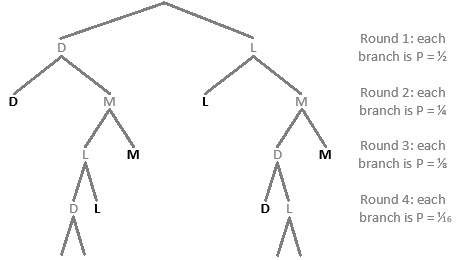Mortal Kombat
Danielle, Lilliana, and Melody play a fighting video game in tournament mode. In this mode, two players play a match, and the winner of the match plays a new match against the player who was sitting out. This continues until a player wins two matches in a row. Danielle and Lilliana play the first match.
If they are all equally skilled at the game, then what is the probability that Melody will win the tournament?
The answer is 0.285714286.
This section requires Javascript.
You are seeing this because something didn't load right. We suggest you, (a) try
refreshing the page, (b) enabling javascript if it is disabled on your browser and,
finally, (c)
loading the
non-javascript version of this page
. We're sorry about the hassle.
4 solutions
Neat solution.
So elegant.
The following probability tree can be constructed to describe the possible outcomes of the tournament, where D represents a match that Danielle wins, L represents a match that Lilliana wins, and M represents a match that Melody wins:

In Round 3, where each branch is worth 8 1 , Melody can win the tournament in 2 possible ways, for at least a 2( 8 1 ) = 4 1 probability. In Round 4, where each branch is worth 1 6 1 , the tournament can continue on to repeat itself, giving Melody another chance to win later on, in 2 possible ways, at a 2( 1 6 1 ) = 8 1 probability. Therefore, the probability P that Melody can win the tournament can be expressed by the infinite expression
P = 4 1 + 8 1 ( 4 1 + 8 1 ( 4 1 + 8 1 (…
Substituting P into the above equation gives
P = 4 1 + 8 1 P
and solving this equation for P gives P = 7 2 or P = 0.285714286.
"giving another chance to win melody later on...in 2 possible ways,2 (1/16)" but I don't get it.melody would win 2 round later after 1st win(on 3rd round),so why it wouldn't be....(1/8) (1/2) (1/2) 2=2*(1/32)??
please explain.
The tournament has the potential to continue on infinitely if the newcomer keeps on winning. This happens in 2 ways by Round 4 (branch DMLD... and branch LMDL...) and since each branch in Round 4 is worth 1/16, the probability of the tournament continuing past Round 4 is 2 * (1/16) or 1/8. If this were to happen, the above diagram of the tournament probability tree would be repeated for Rounds 5-8 (and then again for Rounds 9-12, and so on). So Melody can win the whole tournament in Round 3 at a 1/4 probability, but if not then the tournament could continue past Round 4 at a 1/8 probability so that she can win the whole tournament in Round 7 at a 1/8 * 1/4 probability (or Round 11 at a 1/8 * 1/8 * 1/4, and so on).
Danielle wins with probability d , Lilliana with l , and Melody with m . Since Danielle and Liliana play the first match: d = l , and since somebody does win eventually: d + l + m = 1 , so m = 1 − ( d + l ) . Following probability tree, I get this expression for the probability of either Danielle or Lilliana winning:
2 ( 2 2 1 + 2 4 1 + 2 5 1 + 2 7 1 + 2 8 1 + 2 1 0 1 + 2 1 1 1 + … )
With gaps at powers 3 , 6 , 9 , … , the expression constitute of two geometric series that sum to 5 / 7 , so c = 2 / 7 .
Melody doesn't care who wins the first match. But once she play she must win her first game. On the next game she can either win or lose.
If she wins the game end, but if she loses, this new player must lose his next game (or he won the game and Melody lost). At this stage we are at the same position as her first game.
M = 2 1 ( 2 1 + 2 1 ∗ 2 1 ∗ M )
So M = 7 2
No matter what happens in the first match, Melody finds herself as the "new player", N , against a winner, W , with a third person as a loser, L . Let P ∗ be the probability that a person currently in state ∗ wins the tournament.
For the "loser" to win, they first need the "new player" to win (else the tournament would end). Then, they become the "new player": P L = 2 1 ⋅ P N
For the "new player" to win, they first need to win the match against the "winner". Then, they become the "winner": P N = 2 1 ⋅ P W
For the "winner" to win, they can either win immediately, or if they lose they become the "loser": P W = 2 1 + 2 1 ⋅ P L
Solving these three equations gives P N = 7 2 .